Fort Bowie
| Fort Bowie | |
|---|---|
| Apache Pass, Arizona | |
|
Fort Bowie in 1893. | |
| Type | Army fortification |
| Site information | |
| Controlled by |
|
| Condition | tourist attraction |
| Site history | |
| Built | 1864 |
| Built by |
|
| In use | 1862 - 1894 |
| Garrison information | |
| Occupants |
|
Fort Bowie was a 19th-century outpost of the United States Army located in southeastern Arizona near the present day town of Willcox, Arizona. The remaining buildings and site are now protected as Fort Bowie National Historic Site.
Fort Bowie was established by the California Volunteers in 1862 after a series of engagements between the California Column and the Chiricahua Apaches. The most violent of which was the Battle of Apache Pass in July 1862. The fort was named in honor of Colonel George Washington Bowie commander of the 5th Regiment California Volunteer Infantry who first established the fort. The first Fort Bowie resembled a temporary camp rather than a permanent army post. In 1868, a second, more substantial Fort Bowie was built which included adobe barracks, houses, corrals, a trading post, and a hospital. The second Fort Bowie was built on a plateau about 300 yards (270 m) to the southeast of the first site. For more than 30 years Fort Bowie and Apache Pass were the focal point of military operations eventually culminating in the surrender of Geronimo in 1886 and the banishment of the Chiricahuas to Florida and Alabama. The fort was abandoned in 1894.
History
Two engagements between the United States Army and the Chiricahua led to the construction of Fort Bowie in 1862. The first engagement, known as the Bascom Affair, took place in January 1861 when a band of Apaches raided the ranch of John Ward. Ward mistakenly believed that Cochise and the Chiricahua Apaches were responsible for the raid and demanded that the military take action against Cochise to recover property stolen during the raid. The next month, the army responded to Ward's request by sending Lieutenant George Nicholas Bascom and fifty-four men to Apache Pass to confront Cochise. Bascom managed to capture Cochise and threatened to hold him hostage until Ward's property was returned but the Apache leader managed to escape. Sporadic fighting between Cochise's warriors and Army troops would continue for years to come.

The second major engagement was the Battle of Apache Pass, fought from July 15 to July 16, 1862. A Union regiment under Brigadier General James Henry Carleton was ambushed by a band of Apaches while en route from California to New Mexico where they were to confront Confederate troops. This battle led to the eventual establishment of Fort Bowie in order to protect Apache Pass and an important source of water, Apache Spring. Construction on the first Fort Bowie began in 1862 but this resembled a temporary camp rather than a permanent military fort. In 1868, a second, more substantial Fort Bowie was built on a plateau about 300 yards (270 m) to the southeast. For more than 30 years Fort Bowie and Apache Pass were the focal point of military operations eventually culminating in the surrender of Geronimo in 1886 and the banishment of the Chiricahuas to Florida and Alabama. The fort was abandoned in 1894.
Commanders
- Major Theodore H. Coult July 27, 1862 - September 1862
- Captain Hugh L. Hinds September 1862 - May, 1863
Garrisons of Fort Bowie
- Company G, 5th California Infantry. July 27, 1862 - January 1863
- Company E, 5th California Infantry. January 1863 - May, 1863
- Company K, 5th California Infantry. May, 1864 - September, 1864
- ?
- Company L, 1st California Cavalry. June, 1865 - January, 1866
- ?
- Company L, 1st California Cavalry. March, 1866 - April, 1866
Fort Bowie today
| Fort Bowie National Historic Site | |
|---|---|
|
IUCN category V (protected landscape/seascape) | |
 | |
| Location | Cochise County, Arizona, United States |
| Nearest city | Bowie, Arizona |
| Coordinates | 32°08′46″N 109°26′08″W / 32.14611°N 109.43556°WCoordinates: 32°08′46″N 109°26′08″W / 32.14611°N 109.43556°W |
| Area | 999.45 acres (4.04 km2) |
| Established | July 29, 1972 |
| Visitors | 9,656 (in 2005) |
| Governing body | National Park Service |
|
Fort Bowie and Apache Pass | |
| Built | 1862 |
|---|---|
| NRHP Reference # | 72000194[1] |
| Significant dates | |
| Added to NRHP | July 29, 1972[2] |
| Designated NHL | December 19, 1960[3] |
The Fort Bowie and Apache Pass site was declared a National Historic Landmark in 1960.[3][4][5]
The remains of Fort Bowie are carefully preserved, as are the adobe walls of various post buildings and the ruins of a Butterfield Stage Station. The site is located on the unpaved Apache Pass Road which can be accessed from Interstate 10 near Bowie, Arizona or from Arizona Highway 186 just north of the entrance to Chiricahua National Monument. Access to the ruins of Fort Bowie and the visitor center is via a 1.5-mile (2.4 km) foot trail which begins at a parking area along Apache Pass Road. This trail to the old fort passes other historic sites such as Apache Spring, Siphon Canyon, the ruins of the Butterfield Stage Stop and Bascom's Camp.
In 1958 a Western entitled Fort Bowie was made, starring Ben Johnson. The film charted one of the disputes between the US Cavalry based at the fort and the Apaches.
Gallery
-

Fort Bowie, circa 1880.
-

Fort Bowie in 1893.
-

Present day ruins of Fort Bowie.
-

Fort Bowie site today.
References
- Douglas C. McChristian, Fort Bowie, Arizona: Combat Post of the Southwest, 1858-1894, University of Oklahoma Press, 2006. ISBN 0-8061-3781-9, ISBN 978-0-8061-3781-0
- ↑ "Fort Bowie and Apache Pass" (PDF). National Survey Of Historic Sites And Buildings. National Park Service.
- ↑ "National Register Information System". National Register of Historic Places. National Park Service. 2007-01-23.
- ↑ 3.0 3.1 "Fort Bowie and Apache Pass". National Historic Landmark summary listing. National Park Service. Retrieved 2007-09-27.
- ↑ "National Register of Historic Places Inventory-Nomination" (PDF). National Park Service. December 1975.
- ↑ "National Register of Historic Places Inventory-Nomination" (PDF). National Park Service. December 1975.
External links
| Wikimedia Commons has media related to Fort Bowie. |
- American Southwest, a National Park Service Discover Our Shared Heritage Travel Itinerary
- National Park Service: Fort Bowie National Historic Site
- Historic American Buildings Survey (HABS) No. AZ-63, "Fort Bowie (Ruins), Bowie vicinity, Cochise County, AZ"
- HABS No. AZ-63-A, "Fort Bowie, Cavalry Barracks"
- HABS No. AZ-63-B, "Fort Bowie, Corrals"
- HABS No. AZ-63-C, "Fort Bowie, Infantry Barracks"
- HABS No. AZ-63-D, "Fort Bowie, Commanding Officer's Quarters"
- HABS No. AZ-63-E, "Fort Bowie, Guardhouse"
- HABS No. AZ-63-F, "Fort Bowie, Schoolhouse"
- HABS No. AZ-63-G, "Fort Bowie, New Hospital"
- HABS No. AZ-63-H, "Fort Bowie, Sutler's Store"
- HABS No. AZ-63-I, "Fort Bowie, Magazine"
- HABS No. AZ-63-J, "Fort Bowie, Stage Station (Ruins)"
| ||||||||||||||||||||||||||
| ||||||||||||||||||||||||||||||||||||||||||||||||||||||||||||||||||||||||||||||